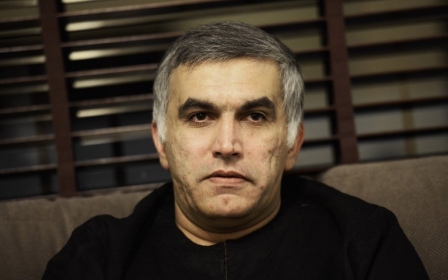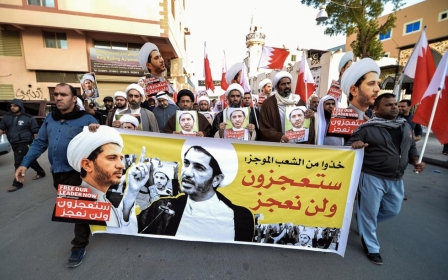Dissent and the Gulf

The list of names could read as a rogues gallery, or the Gulf Cooperation Council’s (GCC) equivalent of the FBI’s most wanted. But these are not hardened criminals. These are 10 people who have had the temerity to peacefully question the authority of the Gulf ruling families. They are a journalist, a politician, two bloggers, a lawyer, three human rights campaigners, and two advocates of women driving in Saudi Arabia.
It is worth mentioning their names, if only so that their courage and defiance is acknowledged:
Dr Saad al Ajmi, Sheikh Ali Salman, Raif Badawi, Waleed Abu al-Khair, Nabeel Rajab, Zainab al-Khawaja, Saed Jadad, Nawaf al-Hendal, Maysaa al-Amoudi and Loujain al-Hathloul.
The list could go on and on. Behind those 10 are dozens more who deserve to be named. And behind them are hundreds more again. Indeed, when you add in detainees of Saudi Arabia, there are thousands of people already languishing in Gulf jails under a blizzard of laws that include draconian anti-terror legislation.
The crimes with which the 10 have been convicted or with which they are being charged range from defamation, to insulting a ruler, to plotting the overthrow of a government. But boiled down to the essential truth, what these people have done is to challenge, to question, to demand transparency and the right to breathe freely. And they have done so not with threats of violence but rationally, thoughtfully and reasonably. They come from different sects, different GCC states and from different political and religious perspectives and yet, although most are unknown to each other, they are united.
And that is why the ruling families see them as such a danger. Despite what the 10 dissenters are accused of, they steadfastly insist in their own separate ways on a peaceful roadmap toward significant change in societies where change cannot much longer be forestalled. That change will necessarily require the ruling families to surrender some power and allow the people they rule a clear voice in how they are governed. Needless to say it is not a picture the families are at all comfortable with. After all, they have reigned with absolute control, some for decades, others for centuries.
The dissenting 10
Dr Saad al-Ajmi is a respected Kuwaiti journalist and university professor. He was even for a brief time a government minister. He is a successful businessman and sits on the board of the Next Century Foundation (NCF), a London-based think tank. He was arrested 10 January over an article published two years ago concerning a corruption scandal involving the finance minister.
William Morris, the secretary general of NCF describes the arrest as a “shattering signal” to the Kuwaiti press. “Kuwait has been in the vanguard (of media freedom) in the GCC, in the region and this is a real step backwards.”
Bahraini opposition leader Sheikh Ali Salman remains in detention more than a month after he was arrested on charges of “inciting hatred against the regime”.
Sheikh Salman is the secretary general of al-Wefaq, the main opposition party. Khalil al-Marzook, a senior party leader, says the charges are patently untrue, noting that all of the secretary general’s speeches are in the public domain and the sheikh has consistently called for peaceful protest in the nearly four years since a pro-democracy movement was crushed by government troops and security police.
"This guy is a leader of peace, this guy is the one who has preserved Bahrain and the region from severe violence,” argues al-Marzook.
Meanwhile human rights activists Nabeel Rajab and Zainab al Khawaja have both felt the full force of Bahrain’s anti-terror laws.
Ms al Khawaja was recently given a three-year sentence for tearing up a picture of the king and remains in jail despite just having given birth to a baby boy.
Nabeel Rajab is appealing a six-month jail term for a tweet he wrote that referred to the military as an “incubator” of terrorism. He has already served several terms in jail, the most recent was for two years for engaging in peaceful but banned public protests.
In Saudi Arabia, the weekly 50 lashes of blogger Raif Badawi have been at least temporarily suspended thanks to an international outcry but he is still facing 10 years in jail on charges of insulting Islam and criticising clerics.
Less well known is the case of one of Badawi’s lawyers, Waleed Abu al-Khair. He heads up an independent NGO, Monitor of Human Rights in Saudi Arabia. He was convicted of among other things “incitement of public opinion against authorities” and “setting up and supervising an unlicensed association.” He was sentenced to 15 years in jail.
And two young Saudi women, Maysaa al-Amoudi and Loujain al-Hathloul have had their cases referred to a special court that deals with terrorism charges. They were arrested after driving a car to the border of the United Arab Emirates in protest at the ban on women drivers.
There is thus far no indication that under the new Saudi king Salman, widely viewed as more conservative than the late King Abdullah, these cases will be reviewed or that there will be any let up on efforts to smother dissent.
In Oman, the activist Saed Jadad is reported to have gone on a hunger strike after being detained over comments he made on his Facebook site. That information was reported by a website run by the Gulf Centre for Human Rights.
But the site which deals chiefly with alleged human rights violations in the UAE was blocked in that country on 29 January as, in true Orwellian fashion, it “falls under the Prohibited Content Category of the UAE’s Information Access Management Policy.”
Commenting on the ban, the veteran UAE human rights activist Ahmed Mansoor told me: “The repression and persecution of political dissent in the Gulf will continue. The space for dissent is already getting tighter and we are just at the beginning of the curve.”
As if to underline his point, comments by the Kuwaiti blogger Nawaf al-Hendal about the death of Saudi king Abdullah have resulted in a warrant being issued for his arrest.
Unease at the top
This upsurge of detentions and convictions is a measure of just how uneasy the ruling families are feeling. They were already troubled by the Arab Spring and calls for democracy. And then along came the Islamic State (IS). There is no question that its emergence has rattled them. The ideologues of IS have pointedly and very publicly attacked the Islamic legitimacy of the families and thus their right to rule, using an exceptionally clever and adept manipulation of new media to do so.
But in an irony that is as apt as it must be unsettling to the families, many of their subjects have been inculcated in education systems with much the same ideology as that which the fanatics spout - the Wahhabist version of Islam, bleak, ruthless and sectarian. In social media chat rooms and behind closed doors IS is seen not as a terrorist group but as a heroic Sunni insurgency fighting Shia repression.
What then can the ruling families, particularly the house of Saud do? They are in no position to come down hard on the fellow travellers and armchair supporters of IS. That would provoke at the very least uncertainty and insecurity among their people which could easily lead to serious protests, even violence.
In their understandable confusion about how to avoid a nightmare scenario largely of their own making, the families have reached out to a familiar soft target: the peaceful activists calling for change.
And the West, equally worried about the threat of IS, has quietly gone along. Once again security trumps democracy and the legitimate struggle for human rights is pushed aside.
As Ahmed Mansoor puts it: “It is the perfect time, they need each other, so this is not a time to defend human rights.”
But then he makes another point. “They can’t control what goes on in the minds of the people.”
Dissent, he suggests, will be stifled but it will not be silenced. And here are 10 dissenting voices who prove why that is so. They are worth remembering:
Dr Saad al-Ajmi, Sheikh Ali Salman, Raif Badawi, Waleed Abu al-Khair, Nabeel Rajab, Zainab al-Khawaja, Saed Jadad, Nawaf al-Hendal, Maysaa al-Amoudi, Loujain al-Hathloul.
- Bill Law is a Sony award-winning journalist. He joined the BBC in 1995 and since 2002 has reported extensively from the Middle East. He has travelled to the Kingdom of Saudi Arabia many times. In 2003 he was one of the first journalists to cover the beginnings of the insurgency that engulfed Iraq. His documentary The Gulf: Armed & Dangerous which aired in late 2010 anticipated the revolutions that became the Arab Spring. He then covered the uprisings in Egypt, Libya and Bahrain. He has also reported from Afghanistan and Pakistan. Before leaving the BBC in April 2014, Mr Law was the corporation’s Gulf analyst. He now works as a freelance journalist focusing on the Gulf.
The views expressed in this article belong to the author and do not necessarily reflect the editorial policy of Middle East Eye.
Photo: A protester throws back a tear gas canister as a group of people stage a protest against the arrest of Ali Salman Manama, Bahrain on 23 January
Stay informed with MEE's newsletters
Sign up to get the latest alerts, insights and analysis, starting with Turkey Unpacked
Middle East Eye delivers independent and unrivalled coverage and analysis of the Middle East, North Africa and beyond. To learn more about republishing this content and the associated fees, please fill out this form. More about MEE can be found here.





